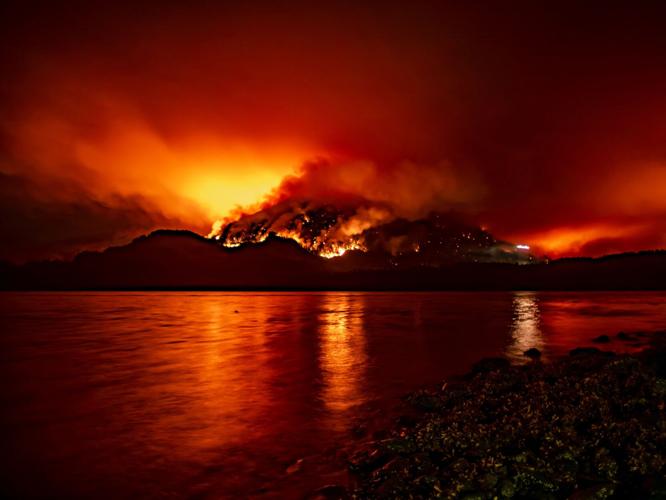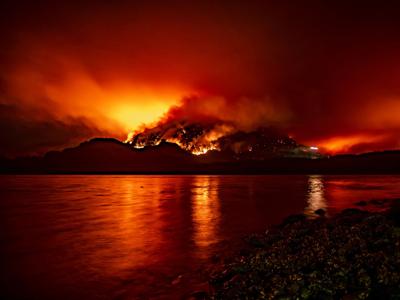No nation in the world has successfully managed more varieties of extreme weather than Canada.
The first settlers knew that if you did not have enough firewood by November, you were not likely to survive until spring. Coastal Canadians endured some of the most incredible snow storms, rain and hurricane winds. We’ve managed droughts, tornadoes, blizzards, ice storms and floods. But we are bungling the climate’s newest menace.
Fire.
Back in the day, wildfires used to be a challenge in the summer in the boreal forest, occasionally threatening small northern towns. Today, they run from snow melt to autumn frost, from the Yukon to Nova Scotia. This year may be our worst ever.
Incredibly, the number of human fatalities has stayed remarkably low. Animals are a painfully different story. But the number of courageous firefighters who get serious respiratory diseases from toxic smoke grows annually. Would we treat our urban firefighters this way?
We know what we need to do, we just don’t do it. The Federation of Canadian Municipalities has been pleading for years for a national agency building a national fleet of Canadian-built water bombers. Nobody listened.
Effective fire prevention is much harder than firefighting, especially in this lightning-driven world of fires driven by climate change. It takes years, costs a great deal, requires forest management, and three levels of government to work in harmony — never our best attribute as a nation. We must do better prevention, but we also need to get much better at firefighting urgently.
Firefighting should not mean so often tackling blazes that are already out of control. In high winds a fire can grow from first sight to out-of-control in less than 30 minutes. Experts have recommended heat and smoke detectors on tall pylons near endangered communities. Others recommend low-earth orbit satellites that could save precious minutes in remote locations.
But most of all, we must get better at training and paying, and simply more respectful of the work that firefighters do. Supplying the equipment they need where and when they need it. The catastrophic Jasper fire was not spotted for half an hour, took Parks Canada another 30 minutes to marshal a fire fighting plan, only to discover they did not have enough planes. The incompetence helped destroy a historic community.

An aerial photo released on June 2 shows smoke rising from a wildfire near the northern British Columbia (B.C.) town of Fort Nelson.
Lin Wei TNSEvery government knows the fires are coming. But each year officials whine that the fire “got out of control, because we did not have the firefighters, water bombers, and helicopters that we needed.” This verges on criminal negligence.
If we had underfunded city fire departments, the politicians responsible would receive the swift boot they deserve. They claim that they simply do not have the money we need. Oh, really? British Columbia spent nearly $1 billion in each of 2021 and 2023, fighting fire and flood, and lost 2.84 million hectares of land. That would buy a lot of water bombers.
We have never had a very good track record about treating fire seriously. Only a small shift in the winds saved the nation’s capital from complete destruction in the Great Fire of 1870. It kept burning underground and re-emerged the following spring. Ottawa’s recklessness included permitting more than two million board feet of lumber and logs to be stored near the Parliament Buildings building site. It took another fire and 30 years for city council to ban the lumber barons’ outdoor log storage on the Ottawa River.
It is far past time that we demanded a national fire strategy and an executing agency. We have a bizarre allocation of personnel and equipment today. Yukon had 20 water bombers this spring, Nova Scotia, none. We need enough firefighters so that none have to work today’s life endangering 10 to 12 hour shifts; building and equipping enough water bombers and helicopters so that multiple fires can be fought simultaneously.
How many more years will be faced with tens of thousands of Canadians evacuated from their burning towns, jammed into motels facing only a grim uncertain future? It’s time we began to respect the power of fire, the way our forebears did oceans, blizzards and droughts.
Error! Sorry, there was an error processing your request.
There was a problem with the recaptcha. Please try again.
You may unsubscribe at any time. By signing up, you agree to our and . This site is protected by reCAPTCHA and the Google and apply.
Want more of the latest from us? Sign up for more at our newsletter page.




























To join the conversation set a first and last name in your user profile.
Sign in or register for free to join the Conversation